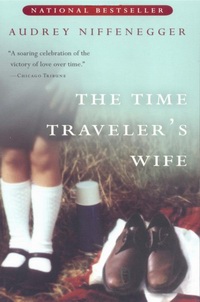A review of The Time Traveler's Wife
By Jeanne Doherty, Day MLIS
The title of this novel is not a metaphor for something else; the book is about a time traveler and the woman he loves, but this is not science fiction or, really, fantasy. Rather, Niffenegger uses the time traveling to heighten our sense of the connection between the two characters, Henry and Clare. Henry's gift, it transpires, isn't so much a magical power as a disease that he has little or no control over. The one thing he can be sure of is that he will usually jump to a time and place to which he has an emotional connection. It is this conceit that drives the love story between him and Clare. When they meet for the first time, at the beginning of the book, Clare knows exactly who he is: he has visited her since she was 6 years old, and over the years, he has taught her languages, played chess and talked about many things in a meadow that abuts her house. Henry, on the other hand, doesn't know Clare. All of those visits took place in her past, but his future.
Their history, however one sided, adds immediate depth to their romance, but it doesn't seem forced. Many of us, I think, when we fall in love, feel that there are too many things we share in common with the other person for our meeting to be entirely an accident. Although this feeling may be illusory, it is real in its intensity, and it is that intensity that this novel conveys. The time traveling and little paradoxes add confusion and mystery to the story, but that is somehow akin to the confusion and mystery of love. It never feels like a gimmick, but seems to naturally add to your sense that the characters have an affinity for one another, that they share a complex history and an understanding. Their entire life together unfolds as the book continues, and of course they lose that flush of first love, but their connection remains dynamic, not fixed or stale, and that fluidity is somehow best expressed in the mechanism of Henry's time traveling. In this way, I guess the title actually is a metaphor, although the book is smart enough to leave the interpretation up to you.

